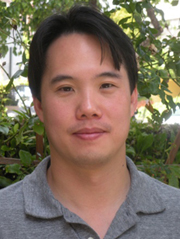
Owl and Bear met with up-and-coming author Charles Yu, who braved 8-foot Pikachus and zombie brides at Comic-Con International 2010 to talk with us about his new book, How to Live Safely in a Science Fictional Universe (Pantheon Books), due in stores September 7, 2010.
At first blush, Charles Yu’s How to Live Safely in A Science Fictional Universe is a classic science fiction comedy complete with a sobbing, suicidal time machine operating system and an ontologically ambiguous robot dog. But surrounding the dark humor of the protagonist, a lonely repairman of chronogrammatical vehicles with temporolinguistic architecture (read: time machines), is a small, sad universe that challenges the polarity of science and art through a unique narrative “technology.â€
“I was trying to explore a fake science of storytelling,†Yu said, when asked about how his book collapses the barrier between science and language. “Reading a book itself is definitely a pretty advanced form of time travel, one we’ve had for a long time… I wasn’t so much trying to rigorously work through any kind of science about it, but just the idea that this is a really amazing technology we already have.â€
Furthermore, Yu contends that, “our ideas shouldn’t be siloed into categories,†and instead should evolve in a more interdisciplinary fashion. “These ideas have a lot to gain from just being mushed together, and they can have new kinds of friction with each other.â€
Yu’s book, because of the time machine conceit, isn’t shackled to traditional modes of narrative technology or typical academic categorizations. Instead, Yu said that he employed “a certain mode of storytelling that is spatial as well as linear,†one inspired by the panels of comic books, a major childhood influence. The challenge to linear storytelling produces quizzical narrative reflections by the protagonist:

The job is pretty chill for the most part, although right this moment I’m not loving it because I think my Tense Operator might be breaking down.
It’s happening now. Or maybe not. Maybe it was earlier today. Or yesterday. Maybe it broke down a long time ago. Maybe that’s the point: if it is broken and my transmission has been shifting randomly in and out of gears, then how would I ever know when it happened? Maybe I’m the one who broke it, trying to fool myself, thinking I could live like this, thinking I could stay out here forever.
In a novel that challenges time and technology, Yu’s protagonist often finds himself in self-reflective musings on aging, a habit born out of Yu’s own lifelong fixation on the subject. “I definitely think about aging too much, and I’ve thought about since I was a kid.†Yu said. “My parents told me that they were freaked out by me when I was like five years old, because I was the oldest five year old they’ve ever met.â€
Yu’s interest in aging comes as a surprise, because Yu isn’t old…not by a long shot. In fact, in 2007, at the age of 31, Yu was recognized by the National Book Foundation in its “5 Under 35†promising new fiction writers for his collection of short stories, Third Class Superhero (Houghton Mifflin Harcourt, 2006). That collection, whose title story humorously features a minor league superhero named Moisture Man who can manipulate small quantities of water, also drew on the Yu’s childhood interest in comic books.
Extra nerdy readers might raise an eyebrow to Moisture Man, recalling Joss Whedon’s 2008 smash hit miniseries Dr. Horrible’s Sing-Along Blog, which featured the similarly named sidekick, Moist. To this, Yu graciously admitted that the two stories “do seem a bit similar,†but conceded that, “I’m sure before breakfast [Whedon] has more original ideas coming out of his head that I do in a year.†However, Yu said that, “I’d be curious, if I ever got in the same room with him. I’d be like, have you ever read my book? And I’d be honored if he did.â€